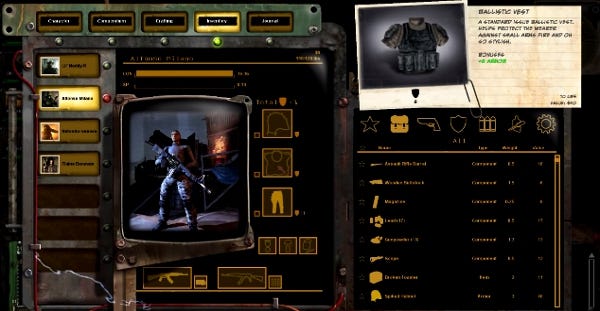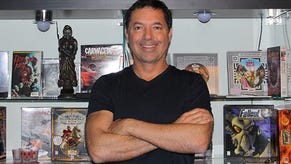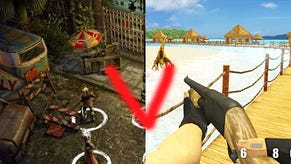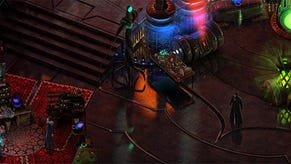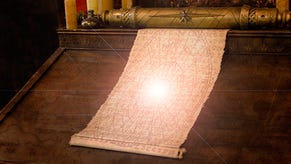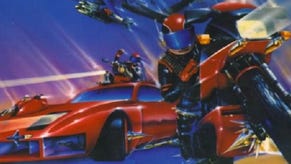How Wasteland 2 Will Acknowledge Gender, Discrimination
Harsh Un-Reality
If all goes according to plan, Wasteland 2 will be one of the most reactive, choice-driven games to grace PCs since man first rubbed two sticks together and invented the keyboard. Everything from juicy bits of dialogue to party members to entire locations can vanish or appear in an instant, all thanks to your actions. And wastelands, well, they tend to be pretty nasty places, radiation-scorched cesspits of violence, prejudice, and, er, waste. So naturally, some characters are going to hate you for simply being, well, you. inXile's hinted at the system in Kickstarter updates, but I found myself exceedingly curious about how it'll all actually come together. Here's what the developer told me.
I adore Fallout 3, but even I'll admit that it was hardly water-tight. If you poked at it enough, you'd eventually find holes: glitches, uninteresting characters, some sloppy quests, and so on. But there was one area where Bethesda's Fallout revival fell flat on its face that I honestly didn't notice until someone pointed it out to me. And truth be told, that fact makes me feel a bit ashamed.
No matter what physical sex you chose, the game treated you like a probably-straight male. RPS comrade and Boobjammer extraordinaire Jenn Frank pointed it out in a brilliant piece a while back, and after getting a glimpse of things from her point of view, it became glaringly difficult to ignore. Threats, reactions to my actions, the odd pick-up line - all delivered as though addressed to a default "regular" dude (especially throughout the main storyline).
That was bad enough on its own, but really the game just didn't acknowledge much about what I was or who I was with at all. Sex/gender was only the beginning. And I think that's a shame because a) it made the world go from living, breathing place to desert of unblinking, defective automaton dolls and b) letting people fully inhabit characters with day-to-day experiences different from their own both enriches those people and makes game characters more interesting. It struck me as a huge missed opportunity, especially in light of the fact that desperate, dog-eat-dog post-apocalyptic situations can explore these topics from angles that fantasy, futuristic sci-fi, and the real world can't even begin to touch.
So I was quite pleased to hear that Wasteland 2 will pay close attention to precisely that. Party composition and your various characters' identities will be under frequent scrutiny by wastelanders' mistrusting glares, a holdover from the real world turned up to 11 by the fact that this setting isn't particularly kind to those who hand out free hugs with reckless abandon. Or anyone really, for that matter.
At one point during my multi-part Wasteland 2 demo session, we came across a traveling salesman straining muscles and herniating discs to get his cart out of the mud. He seemed nice enough - at least, once we freed his wares from their waist-deep grave. Apparently, however, he could've changed his tune in any number of ways if our party had been even the slightest bit different.
"Here’s a merchant that turns into a store if you help him get his cart out of the mud," explained inXile president Matt Findley. "Otherwise he’s just a guy that hates you. The conversation that he has with you is really dependent on so many different factors – the makeup of the party. He has different lines if you come up with an all-women party or if there’s a really high charisma male. There are little flags that he’ll react to."
Wasteland 2 isn't necessarily trying to make a statement, though. Rather, the goal is to portray a world full of interesting individuals - each with their own preferences and prejudices. This place certainly isn't a kind one, so some will inevitably be assholes. Others might give you the benefit of the doubt simply because you've picked a certain sex/background or brought a certain character with you.
"That particular character loves all-women parties," Findley continued, still referring to the merchant. "But some characters might not give any information to an all-women party, because they might have a problem with women. The idea is to make each NPC unique in their world view. A guy might be more likely to give women information or more likely to give men information. This guy specifically, I think he says something inappropriate, and then raises his prices."
It's an admirable attempt at infusing the world with its own internal realism, but also a risky one. What if most of the game's male NPCs speak to women in overtly (or covertly) sexual fashions, whether being jerky or "nice"? What if a majority of characters of a certain gender or preference end up in negative roles or clustered into joke factions? Or - those concerns in mind - what if inXile ends up playing it too safe, creating an implausible wasteland of rainbow sparkles and butterfly kisses? For his part, Findley was confident that his studio has crafted a balanced, believable setting.
"We want to be true to the individual characters, and not try to apply some sort of global morality to all the characters in the world," he said. "We want to allow the characters to be unique and to have their own world view and to be consistent."
But when mechanics are tied closely to character and story, sometimes certain choices can garner preferential treatment despite a developer's best intentions. Think of morality-based games where the "evil" side grants cooler powers. That sort of thing. In these situations, it's not that left hand and right hand have never met. It's that they don't quite see eye-to-eye, and the message they write together comes out muddled and sloppily skewed. Again, however, inXile is doing its best to make sure nothing slips through the cracks.
"Whatever your party makeup, however the world reacts to it, there’s nothing that’s like, 'This is the right one. This gives you an advantage. This other one is the wrong one.' There’s enough diversity in the characters that you deal with that no matter how it’s made up, there will be some advantages and some disadvantages," Findley clarified.
"And then some of the reactivity is just cosmetic. It’s just changing the intro line or the exit line. If you come in with an all-women party, the only thing that might change is, when the conversation is over, he’s like, 'Have a good day, ladies!' As opposed to just, 'Have a good day!' Some of that reactivity just makes it a bit more personal, a bit more unique."
Topics like preference, prejudice, and discrimination won't grind to a halt at physical characteristics, either. Wasteland's world is quite far removed from our own, so it has its own set of histories, oppositions, and even atrocities. Various factions treat each other with utmost contempt, and those morasses of ugly, burbling hatred will color interactions between many characters, festering like a disease. Findley pointed to the Red Skorpions as an especially hateful group.
But again, it all comes down to individual characters at the end of the day. There are exceptions to every rule, and there are exceptions to those exceptions. For now, it's just good to know that inXile is doing its damndest to carve intimate details where most developers would never even consider looking. Sometimes it's not about the size or scope of your world. Without love for every last element - whether tiny minutiae or huge acknowledgements of the fact that anyone could be playing your game - it's all just a giant waste.
